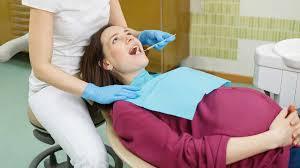
The health of an unborn baby depends on the health of its mother. Changes during pregnancy occur throughout the body, including in the oral cavity due to decrease in immunity and impaired calcium metabolism. If the expectant mother has an infection in the mouth, then it is possible that the child will subsequently develop caries on the milk teeth.
How does pregnancy affect dental health?
Intensive care of your teeth is very important during pregnancy and lactation because the teeth become especially sensitive to external influences. In addition, the gums are also exposed to great danger due to hormonal changes in the body. They can change their color due to edema, as well as bleed at the slightest injury from a toothbrush or solid food.
As a result, there is a change in the composition of dental plaque with a sharp increase in the number of harmful bacteria. Accumulated plaque causes inflammation of the gums, or gingivitis. To avoid this disease, it is necessary to take care of the oral cavity and remove food debris. If this is not done, then gingivitis can develop into periodontitis, which is a more severe gum disease and requires complex treatment.
When bacteria accumulate in the oral cavity, it becomes possible for them to enter the woman’s blood stream. That leads to subsequent development of inflammatory complications that threaten the health of the mother and child.
Toxicosis during pregnancy can lead to increased sensitivity of the teeth, the development of non-carious lesions, difficulty in oral hygiene, etc.
Advice for expectant and young mothers on dental care.
An electric toothbrush can improve oral cavity hygiene becauseit can clean the most difficult to reach areas. Molars are the most prone to caries, so pay special attention to them.
If you're pregnant, then teeth brushing after each meal becomes a necessity. Later you will be grateful for these efforts you’ve put to save your dental health. Brushing should be done in a circular motion from the gums to the teeth for 3-5 minutes. Choose a medium hardness brush. The toothpaste should help to strengthen the enamel and have an anti-inflammatory effect. In addition, the paste must be hypoallergenic. Ideally, your toothpaste should contain herbal extracts.
It is also recommended to use a mouthwash that enhances the effect of the toothpaste and has a deodorant effect. An irrigator will serve you well for cleaning the interdental spaces. Do not give up the use of dental floss, which removes food debris between your teeth.
Nutrition during pregnancy should be balanced to ensure that optimal amounts of vitamins and minerals are supplied to the body. Avoid soda and sugary drinks. Restrain from foods containing fast carbs, like sweets, cookies, cakes. Reducing their amount is alright if you are a sweet tooth. Instead, add more products thatcontain calcium to your diet, as too much of it is washed out the bones to form a baby’s skeleton.
Enamel breakdown can be initiated by fruits or vegetables rich in organic acids, so rinse your mouth with baking soda if you feel soreness after eating sour products.
To strengthen tooth enamel and increase the resistance of teeth to the damaging factors, dentists recommend fluoridation with solutions and varnishes. Fluorides inhibit the metabolism of bacteria, help the surface of the teeth become stronger, and weaken the effects of acids.
The ideal option for a woman is a comprehensive treatment of the entire oral cavity at the stage of planning a child. Such a step is not always possible, but it is a bad idea to neglect a visit to the dentist.
There is a misconception that teeth cannot be treated during pregnancy. Dental treatment does not pose a threat to neither for an expectant woman, nor for her child. The doctor can easily select the appropriate drugs and the minimal dose of anesthesia, according to the gestational age. Pay attention that X-rays are contraindicated in the first weeks.

